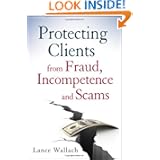IRS Audits 419, 412i, Captive Insurance Plans With Life
Insurance, and Section 79 Scams
By Lance Wallach
June 2011
The IRS started auditing 419 plans in the ‘90s, and then
continued going after 412i and other plans that they considered abusive,
listed, or reportable transactions, or substantially similar to such
transactions.
In a recent Tax Court Case, Curcio v. Commissioner (TC Memo
2010-115), the Tax Court ruled that an investment in an employee welfare
benefit plan was a listed transaction in that the transaction in question was
substantially similar to the transaction described in IRS Notice 95-34. A
subsequent case, McGehee Family Clinic, largely followed Curcio, though it was
technically decided on other grounds. The parties stipulated to be bound by
Curcio on the issue of whether the amounts paid by McGehee in connection with
the 419 Plan and Trust were deductible. Curcio did not appear to have been
decided yet at the time McGehee was argued. The McGehee opinion (Case No.
10-102) (United States Tax Court, September 15, 2010) does contain an exhaustive
analysis and discussion of virtually all of the relevant issues.
Taxpayers and their representatives should be aware that the
Service has disallowed deductions for contributions to these arrangements. The
IRS is cracking down on small business owners who participate in tax reduction
insurance plans and the brokers who sold them. Some of these plans include
defined benefit retirement plans, IRAs, or even 401(k) plans with life
insurance.
In order to fully grasp the severity of the situation, one
must have an understanding of Notice 95-34, which was issued in response to
trust arrangements sold to companies that were designed to provide deductible
benefits such as life insurance, disability and severance pay benefits. The
promoters of these arrangements claimed that all employer contributions were
tax-deductible when paid, by relying on the 10-or-more-employer exemption from
the IRC § 419 limits. It was claimed that permissible tax deductions were
unlimited in amount.
In general, contributions to a welfare benefit fund are not
fully deductible when paid. Sections 419 and 419A impose strict limits on the
amount of tax-deductible prefunding permitted for contributions to a welfare
benefit fund. Section 419A(F)(6) provides an exemption from Section 419 and
Section 419A for certain “10-or-more employers” welfare benefit funds. In
general, for this exemption to apply, the fund must have more than one
contributing employer, of which no single employer can contribute more than 10%
of the total contributions, and the plan must not be experience-rated with
respect to individual employers.
According to the Notice, these arrangements typically
involve an investment in variable life or universal life insurance contracts on
the lives of the covered employees. The problem is that the employer
contributions are large relative to the cost of the amount of term insurance
that would be required to provide the death benefits under the arrangement, and
the trust administrator may obtain cash to pay benefits other than death
benefits, by such means as cashing in or withdrawing the cash value of the
insurance policies. The plans are also often designed so that a particular
employer’s contributions or its employees’ benefits may be determined in a way
that insulates the employer to a significant extent from the experience of
other subscribing employers. In general, the contributions and claimed tax
deductions tend to be disproportionate to the economic realities of the
arrangements.
The 419 plan advertised that enrollees should expect to
obtain the same type of tax benefits as listed in the transaction described in
Notice 95-34. The benefits of enrollment listed in its advertising packet
included:
Virtually unlimited deductions for the employer;
Contributions could vary from year to year;
Benefits could be provided to one or more key executives on
a selective basis;
No need to provide benefits to rank-and-file employees;
Contributions to the plan were not limited by qualified plan
rules and would not interfere with pension, profit sharing or 401(k) plans;
Funds inside the plan would accumulate tax-free;
Beneficiaries could receive death proceeds free of both
income tax and estate tax;
The program could be arranged for tax-free distribution at a
later date;
Funds in the plan were secure from the hands of creditors.
The Court said that the 419 Plan was factually similar to
the plans described in Notice 95-34 at all relevant times. In rendering its
decision the court heavily cited Curcio, in which the court also ruled in favor
of the IRS. As noted in Curcio, the insurance policies, overwhelmingly variable
or universal life policies, required large contributions relative to the cost
of the amount of term insurance that would be required to provide the death benefits
under the arrangement. The 419 Plan owned the insurance contracts.
The McGehee Family Clinic had enrolled in the 419 Plan in
May 2001 and claimed deductions for contributions to it in 2002 and 2005. The
returns did not include a Form 8886,Reportable Transaction Disclosure
Statement, or similar disclosure.
The IRS disallowed the latter deduction and adjusted the
2004 return of shareholder Robert Prosser and his wife to include the $50,000
payment to the plan. The IRS also assessed tax deficiencies and the enhanced
30% penalty totaling almost $21,000 against the clinic and $21,000 against the
Prossers. The court ruled that the Prossers failed to prove a reasonable cause
or good faith exception.
More you should know:
In recent years, some section 412(i) plans have been funded
with life insurance using face amounts in excess of the maximum death benefit a
qualified plan is permitted to pay.
Ideally, the plan should limit the proceeds that can be paid as a death
benefit in the event of a participant’s death.
Excess amounts would revert to the plan.
Effective February 13, 2004, the purchase of excessive life insurance in
any plan is considered a listed transaction if the face amount of the insurance
exceeds the amount that can be issued by $100,000 or more and the employer has
deducted the premiums for the insurance.
A 412(i) plan in and of itself is not a listed transaction;
however, the IRS has a task force auditing 412i plans.
An employer has not engaged in a listed transaction simply because
it is a 412(i) plan.
Just because a 412(i) plan was audited and sanctioned for
certain items, does not necessarily mean the plan engaged in a listed
transaction. Some 412(i) plans have been audited and sanctioned for issues not
related to listed transactions.
Companies should carefully evaluate proposed investments in
plans such as the 419 Plan. The claimed deductions will not be available, and
penalties will be assessed for lack of disclosure if the investment is similar
to the investments described in Notice 95-34. In addition, under IRC 6707A, IRS
fines participants a large amount of money for not properly disclosing their
participation in listed, reportable or similar transactions; an issue that was
not before the Tax Court in either Curcio or McGehee. The disclosure needs to
be made for every year the participant is in a plan. The forms need to be
properly filed even for years that no contributions are made. I have received
numerous calls from participants who did disclose and still got fined because
the forms were not filled in properly. A plan administrator told me that he
assisted hundreds of his participants file forms, and they still all received
very large IRS fines for not properly filling in the forms.
IRS has been attacking all 419 welfare benefit plans, many
412i retirement plans, captive insurance plans with life insurance in them and
Section 79 plans.
Lance Wallach,
National Society of Accountants Speaker of the Year and member of the AICPA
faculty of teaching professionals, is a frequent speaker on retirement plans,
abusive tax shelters, financial, international tax, and estate planning. He writes about 412(i), 419, Section79, FBAR,
and captive insurance plans. He speaks at more than ten conventions annually,
writes for over fifty publications, is quoted regularly in the press and has
been featured on television and radio financial talk shows including NBC,
National Pubic Radio’s All Things Considered, and others. Lance has written
numerous books including Protecting Clients from Fraud, Incompetence and Scams
published by John Wiley and Sons, Bisk Education’s CPA’s Guide to Life
Insurance and Federal Estate and Gift Taxation, as well as the AICPA
best-selling books, including Avoiding Circular 230 Malpractice Traps and
Common Abusive Small Business Hot Spots. He does expert witness testimony and
has never lost a case.

